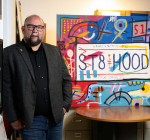Screening and Q&A: Higher Power
Session Type(s): Special Event
Starts: Saturday, Jul. 15 12:00 PM (Central)
Ends: Saturday, Jul. 15 1:30 PM (Central)
Room: Buckingham
Recreational cannabis use is legal in Washington, D.C. Recreational cannabis sales are not. Higher Power uses the stories of Black Washingtonians navigating this gray space while fighting to enter the legal cannabis industry to reveal the stark reality of 700,0000 disenfranchised American citizens and the urgent need for D.C. Statehood. It explores how the D.C. Home Rule Act of 1973 marginalized D.C.’s Black community. It profiles Black cannabis and wellness entrepreneurs serving the community through the gray market and Black-owned licensed medical dispensaries juggling the impacts of a global pandemic and competition from unregulated operators. Higher Power shows how the federal government’s control of the District has made a challenging process almost insurmountable, bolstering the case for D.C’s right to self-rule.
Moderator
Queen Adesuyi

Queen Adesuyi (she/her) is a Policy Strategist for State and Local Government Affairs at Color Of Change (COC) where she helps lead COC’s efforts to overhaul the criminal legal system and safeguard democracy through policy advocacy and strategy. At COC, she is focused on advancing efforts related to decarceration, pre-trial justice, alternatives to policing, drug policy reform, reproductive justice and prosecutorial accountability—leveraging the power of COC’s members to win real-world change for Black people.
Throughout her career, Queen has led and supported legislative and base-building efforts to end the U.S. war on drugs, repair its harms, and replace punitive drug policies with laws grounded in science, compassion, health, and human rights. Queen joins Color of Change after seven years at the Drug Policy Alliance, where she was most recently a Senior Manager of National Policy leading on policy development and advocacy, budget advocacy, technical assistance, coalition building, and public education at the local, state,
and federal levels with a focus on drug decriminalization, harm reduction, marijuana and psychedelic reform, and criminal legal and policing reform. In addition to providing campaign and policy advocacy support nationally, she convened and led the #DecrimPovertyDC coalition and campaign, which is a grassroots, legislative effort in the District of Columbia seeking to decriminalize drugs and radically invest in a harm reduction infrastructure to address the health and well-being of people who use drugs.
While at DPA, Queen saw through the introduction of Congress’ first marijuana reform bill that addressed racial justice and justice reform (the Marijuana Justice Act). She also helped convene and co-led the Marijuana Justice Coalition. Under her co-leadership, the Marijuana Justice Coalition saw through the introduction and the historic passage of the Marijuana Opportunity Reinvestment & Expungement (MORE) Act by the U.S. House of Representatives in the 116th Congress. Additionally, Queen spearheaded the introduction of the first drug decriminalization bill in Congress on the 50th anniversary of when President Nixon declared the War on Drugs (the Drug Policy Reform Act). On the local level, Queen successfully led the campaign that decriminalized possession and community-based organization distribution of drug paraphernalia in D.C., in order to expand access to harm reduction tools—such as safer smoking and snorting kits—previously criminalized as paraphernalia.
Queen is a first-generation Nigerian-American who hails from the Morris Heights area of the Bronx. She is an alumna of Georgetown University (C’16), where she majored in American Studies. Queen is a board member of Mirror Memoirs, where she supports a growing abolitionist organization led by other queer and trans child sexual violence survivors committed to ending the phenomenon without relying on cages. Queen also continues to be a Steering Committee member and campaign organizer for #DecrimPovertyDC in her individual capacity. Queen lives in Washington, D.C., where she is a proud resident of the great Ward 8, and is a dog mom of two adorable pups, Bella and Kashmir.
Panelists
Rafi Aliya Crockett

Rafi Aliya Crockett, a native Washingtonian, is fiercely protective of her city. In addition to being a civically engaged resident who watches D.C. council hearings for fun, she is a proud champion of D.C. culture and patron of the arts. Ms. Crockett is co-president of the board of STABLE Arts, and has previously served on the board of HumanitiesDC and the Museum of Contemporary African Diasporan Arts. Between 2019 and 2023, Ms. Crockett served on D.C.’s Alcoholic Beverage and Cannabis Board. As a Commissioner, she worked with legislators and government agencies to eliminate disparities in access, ownership, and participation in the city’s alcoholic beverage and cannabis industries. The experience inspired her to develop Higher Power with the director Dewey Ortiz Jr. Ms. Crockett serves as the film’s writer and executive producer. This is her first film.
Dewey Ortiz

Dewey A. Ortiz, Jr. is an award-winning filmmaker, writer, and producer. His work is dedicated to shifting perceptions of African Americans in cinema, particularly D.C.’s Black community. Much of his work highlights the perseverance of Washington, D.C. residents. His series, Survivor Stories, chronicling four courageous D.C. women who have survived domestic abuse, won Best Web Series at the 2017 D.C. Black Film Festival. In 2019, Mr. Ortiz completed The Runaways, a powerful short filmed in D.C. and PG County, MD, that follows abused and neglected teenagers as they gather the courage to escape their tumultuous lives. The Runaways enjoyed a successful film festival run culminating in ten festival appearances and a Best Film Award. It is currently available for streaming on KweliTV. Higher Power is his debut feature film.
Bo Shuff

Bo Shuff has spent the last twenty years on the front lines of both electoral and advocacy politics. Or, as the Washington Post described him, Bo is a 49-year-old, opinionated, gay, cake baking, glass blowing political consultant, advocate and Washington won.